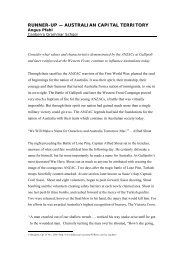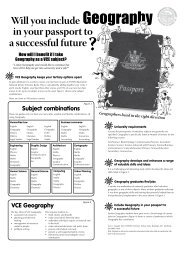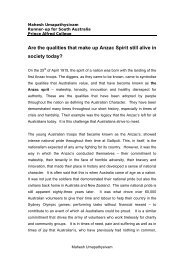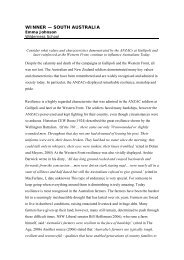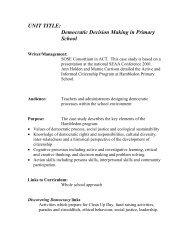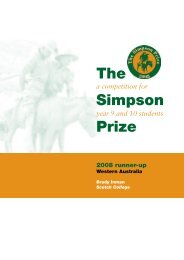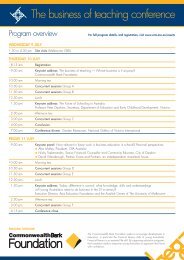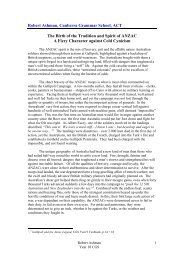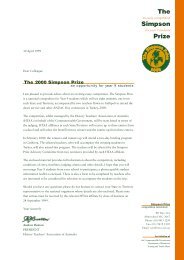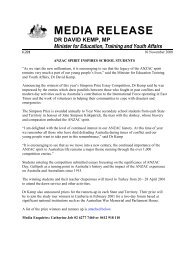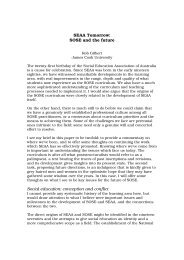Draft Professional Standards for Teaching School Geography - afssse
Draft Professional Standards for Teaching School Geography - afssse
Draft Professional Standards for Teaching School Geography - afssse
You also want an ePaper? Increase the reach of your titles
YUMPU automatically turns print PDFs into web optimized ePapers that Google loves.
<strong>Draft</strong> <strong>Professional</strong> <strong>Standards</strong> <strong>for</strong> <strong>Teaching</strong> <strong>School</strong> <strong>Geography</strong><br />
Cultivating geographical imagination and understanding<br />
Accomplished geography teaching engages students in the classroom and in the field and is built on<br />
substantive knowledge of the discipline. It involves deep understanding of geography teaching, continual<br />
planning, evaluation and renewal of professional practice.<br />
Category<br />
statement<br />
Knowing<br />
geography and<br />
geography<br />
curriculum<br />
<strong>Standards</strong> statement<br />
Accomplished geography teachers:<br />
• know the breadth and depth and of the academic discipline including its<br />
concepts, skills, values and understandings;<br />
• assist students to understand that geography draws from the physical<br />
sciences, the social sciences and the humanities;<br />
• understand current curriculum documents and know the reasons <strong>for</strong><br />
curriculum change;<br />
• locate geography within a wider educational context, making connections<br />
with other curricula and co-curricula areas.<br />
Fostering<br />
geographical<br />
inquiry and<br />
fieldwork<br />
Accomplished geography teachers:<br />
• encourage students to carry out a range of geographical inquiries, from<br />
structured to more open ended and active investigations, from prearranged<br />
problem solving and open ended discovery to negotiated inquiry. Through<br />
these inquiries, students identify topics, generate questions, evaluate the<br />
quality of evidence, process and analyse data, select presentation methods<br />
to communicate the research findings effectively, think creatively about<br />
geographical issues, propose individual or group action in response to the<br />
research findings and, where appropriate, take such action;<br />
• make judgements about the essential skills, processes and values that<br />
students need to develop to carry out meaningful and ethical geographical<br />
inquiries;<br />
• support students to undertake inquiry in the field, to select and use<br />
fieldwork tools and techniques, ranging from simple purpose-built<br />
equipment to digital and video cameras, GIS and environmental sensors,<br />
appropriately, safely and efficiently.<br />
1
Developing<br />
geographical<br />
thinking and<br />
communication<br />
Accomplished geography teachers:<br />
• promote an understanding of both physical processes and human activities<br />
and how they relate to each other in place, space and environments;<br />
• assemble the many strands of geography, providing multiple resources <strong>for</strong><br />
the further development of geographical thinking by students; they set this<br />
comprehensive knowledge in contemporary contexts, opening the way <strong>for</strong><br />
significant interconnections to be made;<br />
• support students to think spatially and use maps, visual images and new<br />
technologies, including geographical in<strong>for</strong>mation systems (GIS), to obtain,<br />
present, analyse and evaluate in<strong>for</strong>mation;<br />
• use case studies to give support to the subject’s breadth and depth;<br />
• encourage students to recognise their personal geographies and to use<br />
these lived experiences as an entry point to understanding the complexities<br />
of the contemporary world, seen through events and issues arising at<br />
personal, local, national and global scales;<br />
• tell ‘stories’ which have real world contexts, whether they are based on the<br />
teacher’s own life experiences, the teacher’s own personal geographies or<br />
others’ narratives and in so doing they make visible their geographical<br />
thinking.<br />
Understanding<br />
students and<br />
their<br />
communities<br />
Accomplished geography teachers:<br />
• build bridges between the sophisticated understanding of the teacher and<br />
the developing understanding of the student;<br />
• bring an enriched understanding of students because of their particular<br />
sensibility to students’ communities; they are alert to the spaces and places<br />
students occupy so that they can incorporate students’ personal<br />
geographies into learning sequences, drawing clear connections with<br />
students’ prior knowledge and identities, from the local community and<br />
beyond;<br />
• enhance student learning by using students’ multiple ways of knowing and<br />
other background elements such as their social and cultural perspectives ;<br />
• enrich learning by incorporating particular insights into the local<br />
community, as a social network of interacting individuals, groups and<br />
social interests, in space, to establish relevance and connection and<br />
incorporate these resources into the curriculum.<br />
Establishing a<br />
safe, supportive<br />
and<br />
intellectually<br />
challenging<br />
learning<br />
environment<br />
Accomplished geography teachers:<br />
• foster dynamic and challenging learning environments characterised by<br />
mutual trust, equity, risk taking, independence, interdependence and<br />
collaboration; they create conditions <strong>for</strong> students to question, rather than<br />
accept without further thought, complex geographical ideas and issues;<br />
• design teaching strategies specifically <strong>for</strong> different backgrounds, learning<br />
preferences, and dispositions of their students;<br />
2
• generate and communicate to the students a ‘need to know’ and their own<br />
high expectations, thereby promoting study of the complexities of place,<br />
space and environments;<br />
• facilitate students’ responsibility <strong>for</strong> learning, to foster students’ ability to<br />
take initiatives; in so doing they affirm the students’ capacities as active<br />
participants in their own learning.<br />
Understanding<br />
geography<br />
teaching –<br />
pedagogical<br />
practices<br />
Accomplished geography teachers:<br />
• have current and extensive understanding of geographical education<br />
processes — pedagogical content knowledge; they select, adapt and create<br />
field specific and general teaching approaches and resources to support<br />
deep understanding of place, space and environments and they justify their<br />
choices about planning and teaching;<br />
• promote geographic inquiry, through which in<strong>for</strong>mation is gathered from a<br />
variety of sources, including fieldwork, libraries, the internet and digital<br />
media, official agencies and print media;<br />
• use fieldwork and outdoor learning as a key practice to develop students’<br />
data collection, analysis and evaluative skills to deepen their understanding<br />
of place, space and environments;<br />
• systematically introduce and develop a range of cartographic, statistical<br />
and graphical geographical tools and skills that enable students to think<br />
and communicate geographically, including making and interpreting maps,<br />
and a range of other representation collectively described as graphicacy<br />
and teach students to critically evaluate maps and other <strong>for</strong>ms of<br />
representation.<br />
Planning,<br />
assessing and<br />
reporting<br />
Accomplished geography teachers:<br />
• design their curriculum in such a way as to spark an interest amongst all<br />
students, an appeal that is active, contemporary, enlivening and sustained;<br />
• plan and continually monitor their students’ learning, using a wide range<br />
of <strong>for</strong>mal and in<strong>for</strong>mal assessments methods;<br />
• prepare assessment <strong>for</strong> learning recognising the positive achievements of<br />
students and indicate the directions <strong>for</strong> improvement;<br />
• conduct summative assessment which is made available to students and<br />
care-givers;<br />
• use assessment methods that are appropriate, valid and reliable; in<br />
reporting students’ achievements and difficulties, they employ a variety of<br />
procedures, ensuring they use clear and accurate language that is suitable<br />
<strong>for</strong> the intended audience;<br />
• employ diagnostic assessment to in<strong>for</strong>m their own teaching and student<br />
understanding.<br />
3
Progressing<br />
professional<br />
growth and<br />
development<br />
Accomplished geography teachers:<br />
• place students at the centre of the learning experience while they continue<br />
to learn and develop as teachers; acknowledging that the greater the<br />
teacher learning, the more students learn as well; their focus is on critically<br />
applying their learning to improve student achievement;<br />
• recognise that the subject of geography is dynamic and evolving and<br />
there<strong>for</strong>e seek opportunities to further develop their disciplinary<br />
knowledge base;<br />
• commit themselves to learning <strong>for</strong>mally, and to critically reflecting on<br />
their experiences both within the classroom and more widely, through<br />
travel, from literature and the arts and through engagement with<br />
professional learning communities.<br />
Learning and<br />
working<br />
collegially<br />
Accomplished geography teachers:<br />
• build a culture of professional improvement by learning from and with<br />
their fellow teachers as well as learning from research; supported by the<br />
professional and school community, they create the conditions <strong>for</strong> teachers<br />
to teach each other, support their peers, and deepen their knowledge about<br />
their students and their subject;<br />
• play an active role in their professional associations, promoting<br />
professional learning and talking publicly about their practice and<br />
involvement in facilitating learning <strong>for</strong> other teachers;<br />
• engage actively as members of their professional and wider community<br />
and work collegially with fellow teachers to improve their teaching and<br />
enhance student learning; they create conditions <strong>for</strong> the growth of open<br />
and collaborative school cultures whereby parents and community<br />
members can play a dynamic role in supporting student learning about the<br />
world;<br />
• distribute and share their teaching expertise towards the continuing<br />
construction of a professional knowledge base <strong>for</strong> school geography;<br />
• communicate educational ideas and promote geographical education<br />
towards contributing to the resilience and renewal of their professional<br />
field.<br />
The '<strong>Standards</strong> <strong>for</strong> <strong>Teaching</strong> <strong>School</strong> <strong>Geography</strong>' project is partly funded through an Australian Research Council Linkages<br />
grant. It is an initiative of the University of Melbourne, Australian <strong>Geography</strong> Teachers' Association (AGTA), <strong>Geography</strong><br />
Teachers’ Association of Victoria (GTAV) and the Victorian Institute of <strong>Teaching</strong>.<br />
The draft of these standards is now complete. The next step in the process to develop standards <strong>for</strong> teaching school geography<br />
is to seek feedback from Australian teachers. The draft can be accessed at www.agta.asn.au<br />
The writers and facilitators of the final draft welcome your feedback and ask that you use the online survey facility<br />
www.agta.asn.au to respond to the document by 12 March 2010. Emailed and telephoned replies are also welcome.<br />
For more in<strong>for</strong>mation regarding this process, please contact jeana@unimelb.edu.au Tel: 03 8344 3753<br />
4




